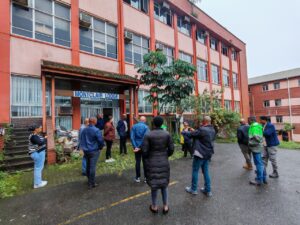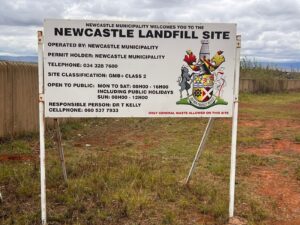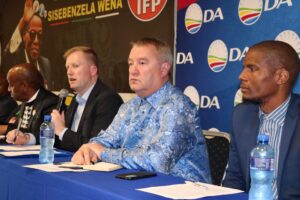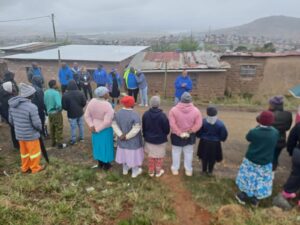(The following debate was delivered by DA KZN Spokesperson on DARD, Sakhile Mngadi, MPL during a KZN Legislature Budget Sitting held today)
The KwaZulu-Natal (KZN) Department of Agriculture and Rural Development (DARD) budget comes at a time when our province finds itself at a pivotal moment. The formation of the Government of Provincial Unity (GPU) – of which the DA is a solid member – has signalled a deep and necessary shift in how governance is approached, not just across parties but in how delivery, accountability and service to KZN’s people is treated.
In this new chapter, politics must serve the people and not the other way around. And nowhere is this truer than in the agricultural sector – where the stakes are not ideological, but practical – food on the table, jobs in rural towns and dignity for those who work the land. Yet, agriculture remains one of the most underutilised engines of economic development in KZN. It holds the power to lift families out of poverty, grow local economies and foster self-reliance. When it works, it feeds both people and hope.
This year’s R2.7billion allocation to KZN DARD is substantial and with it comes great responsibility – to get the basics right, to honour the commitments made in previous years and to turn policy into progress on the ground.
The DA commends DARD on the following, achievements during the past financial year;
• Improved conditional grant management, particularly Ilima/Letsema and CASP. Farmers are reporting faster turnarounds on applications and greater consistency in input delivery with fewer complaints of delays than in previous years. That may seem like a small thing in a budget of this size, but in agriculture, timing is everything. Getting inputs to farmers late can ruin an entire season. In this case, efficiency has real impact and DARD deserves recognition for this progress.
• Stepping up of veterinary services. In the face of outbreaks such as Avian Influenza, the response has been measured and timely. These teams do not always get the spotlight but their work is foundational to biosecurity and the stability of the agricultural economy, particularly in KZN, where livestock farming remains a vital part of both commercial and subsistence activity and;
• Meaningful traction in food security programmes such as One Home, One Garden. Particularly in deeply impoverished communities, these gardens have become the difference between hunger and survival. While not a substitute for long-term economic development, they are a necessary intervention in the short term – and they are working.
But commendation alone is not enough and the DA firmly believes that where rot continues and where public funds are being risked by negligence, inefficiency – and in some cases, political interference – must also be addressed.
In this regard, the Agricultural Development Agency (ADA) is the biggest red flag in this budget. Conceived as a vehicle to unlock blended financing, attract private investment, and support high-potential emerging farmers, ADA has instead become an opaque institution whose work is difficult to monitor, finances are difficult to follow and its beneficiaries difficult to verify.
There is no public record of how ADA beneficiaries are selected, how contracts are awarded, or what return, if any, has been achieved through millions of rands in annual allocations. Year after year, ADA escapes meaningful legislative oversight while absorbing more and more of the DARD’s development budget. The DA is increasingly seeing reports of the same names surfacing in different project areas. Projects allocated without transparency, delays in reporting and contracts issued under questionable procurement processes.
As a result, we have tabled a request with KZN SCOPA and the relevant portfolio committee for a full forensic audit into ADA’s finances, governance practices, and project outcomes going back five years. If there is nothing to hide, then the audit should be welcomed. If there is something to uncover, KZN’s people deserve to know.
In terms of DARD’s broader delivery landscape, infrastructure rollout remains weak. Whether it is fencing, irrigation or access roads, too many DARD projects – launched with much fanfare – are left incomplete due to poor planning or lack of follow-through. Farmers are given hope and then forgotten not to mention irrigation systems delivered without water licenses and fencing materials delivered and never installed. These are not technical errors, they are project failures and each one costs our province dearly.
Extension services are another growing concern. In several districts, particularly uMzinyathi, Zululand and uThukela, entire wards are operating without a single extension officer. Farmers, particularly new entrants, are left to navigate complex production and market systems with no technical assistance. This severely limits their chances of success and undermines the entire rationale of land reform and smallholder support. Government cannot give land to people expecting them to farm and then walk away. That is not empowerment – it is abandonment.
Other provinces are showing what is possible. In regions where governance is driven by performance rather than politics, there are real-time digital monitoring tools for extension officers. There are e-voucher systems that eliminate fraud in input distribution. And there are project selection processes based on merit, productivity and market potential -not political affiliation.
KZN should not be afraid to replicate what works. The Western Cape’s agricultural development model is a practical example of what can be achieved with integrity, planning, and oversight. It is time for KZN to adopt the same approach, tailored to our province’s context, but driven by the same principles of accountability and delivery.
Within rural development, the gaps are even more glaring. For years, provincial government has spoken about agri-hubs, agro-processing and infrastructure to connect rural producers to the formal economy. Yet they fail to materialise at scale. Our farmers still cannot get their produce to market because roads are undrivable, co-operatives fail because there is no cold storage or processing facility to extend product shelf life. These are not luxury demands, they are basics.
If KZN’s DARD budget is to change lives, it must be accompanied by real infrastructure investment. That means prioritising capital spending where it matters: packhouses, farm-to-market roads, mobile processing units and access to power and water in rural agricultural zones.
At a national level, there are promising signs. The appointment of Agriculture Minister, John Steenhuisen, has already injected much-needed urgency and clarity into a department that had stagnated under previous leadership. His firm stance on governance, corruption and performance management is already being felt. A national rural infrastructure acceleration strategy is on the table, with the potential to unlock R2billion in investment over the next two years. KZN must be ready to claim its share but that will only happen if the provincial DARD aligns quickly with national strategy and demonstrates readiness to implement.
If KZN’s DARD wants to be taken seriously as a delivery agent, it must be able to show where the money is going, who is benefiting and how those outcomes are being tracked. It must be prepared to justify every rand, not with rhetoric—but with results. This budget cannot be business as usual. KZN’s people, particularly those in rural communities, have waited too long. Emerging farmers are not asking for favours, they are asking for fair access, honest support and a government that does not disappear after handovers and launches. This moment demands integrity. It demands courage. And above all, it demands delivery.
If DARD is serious about making agriculture the centrepiece of rural development, then its budget must speak through action. If ADA is going to remain in existence, it must function with transparency or be dismantled. The DA remains committed to non-negotiable oversight. KZN’s people are watching – not what we say – but what we do.








